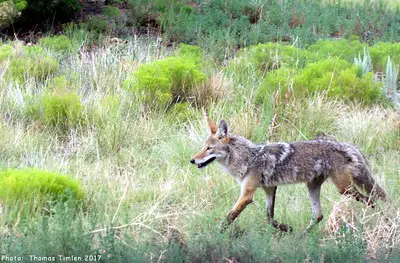There are relatively few rules for hunting coyotes in Virginia. The state has seen an incredible growth in coyote numbers, with some experts estimating they number over 50,000. Before you make your first stand, please check for updates and changes to state and local laws. This information is subject to change, you bear sole responsibility for hunting legally and safely at all times.

In Virginia, coyotes are considered a nuisance species may be taken all year, day or night on private land, and no license is required. On National Forest lands and Department lands hunting is permitted from September 1 through March 10 and during the turkey season.
For updates and changes to regulations for coyote hunting, you can view the state’s website.
Check out all the Virginia hunting seasons.
Related: Learn the rules for hunting fox in Virginia.
Related: Learn the rules for hunting bobcat in Virginia.
***Need to have your trophy mounted by an award winning, professional taxidermist? Then contact Wild Victory Taxidermy for more information.***
General regulations for hunting coyotes in Virginia.
Suppressors. When legally owned, they may be used for hunting.
Baiting. Allowed on private land and some public lands. There is a noted restriction: it is illegal to feed any wild animal when the feeding results in property damage, endangers people or wildlife, or creates a public health concern.
Related: Read this article to learn how to make the perfect bail pile.
Electronic callers. Legal for coyote hunting. Electronic calls may be used to hunt bobcats, coyotes, crows, foxes and raccoons, but not other species. With the exception of crows, written permission of the landowner is required to hunt with electronic calls on private lands. Electronic calls may also be used on public lands (except where specifically prohibited) during periods when the use of firearms is allowed.
Related: What are the two sounds successful coyote hunters love to use?
Related: Learn how to get and keep a coyote’s attention while calling.
Lights, night vision, infrared, and thermal riflescopes. All are allowed on private land. Check for public land restrictions here before hunting coyotes at night.
Related: What is the best night vision scope for a new predator hunter?
Related: How does the ATN Thor 4 thermal riflescope perform in the field?
Related: Just getting started and want to hunt with a light? Here is the best color to use when hunting coyotes at night.
Night hunting. Nuisance species may be taken day or night.
Hunting coyotes in Virginia on a Sunday.
Hunting is allowed on Sundays during the regular hunting seasons under the following circumstances:
- Any landowner or member of his family or any person with written permission from the landowner may hunt on the landowner’s property on Sunday, except within 200 yards of a place of worship or any accessory structure thereof.
- Hunting for waterfowl (ducks, coot, geese, brant, and swan) and rails (including gallinules and moorhens) is allowed on Sundays (on private lands and on public lands as permitted by the landowner) subject to geographical limitations established by the Director of the Department and except within 200 yards of a house of worship or any accessory structure thereof.
- Hunting is permitted on licensed hunting (shooting) preserves.
- Raccoons may be hunted on Sunday.
Other than these exceptions and other allowances that had been made specifically by law in the past, it will continue to be unlawful to hunt or kill any wild bird or wild animal, including any nuisance species, with a gun, firearm, or other weapon on Sundays. It will also continue to be unlawful to hunt or kill any deer or bear with a gun, firearm, or other weapon with the aid or assistance of dogs on Sundays.
Virginia trespass laws coyote hunters need to know.
Trespass violations, posting property, and access issues are all concerns that affect a landowner’s decision to allow hunting.
Hunters are reminded that it is unlawful to hunt on private property without the permission of the landowner, and hunters must have the permission of the landowner to track or retrieve wounded game on private property.
On Posted Property
It is unlawful to hunt without written permission of the landowner and is punishable by a fine of up to $2500 and/or 12 months in jail.
On Unposted Property
It is unlawful to hunt any unposted property without permission of the landowner and is punishable by a fine of up to $500.
A landowner may post their property by any of the following methods:
- Using aluminum or purple color paint, paint a vertical line at least 2 inches in width and at least 8 inches in length, no less than 3 feet and not more than 6 feet from the ground or normal water surface and visible when approaching their property.
- Placing signs that specifically prohibit hunting, fishing, or trespassing on their property.

